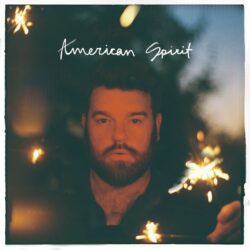Sage lessons woven into smooth melodies make for an easy listen that still carries a meaningful weight.
 There aren’t many artists who can say they cut their teeth making pop music – even spending time opening for Ariana Grande and Meghan Trainor – only to return to their true, first love in Americana, but Arkansas native Fancy Hagood is one of them. The winding path he ended up taking makes a little more sense when you understand that he was never interested in hiding his sexuality and he didn’t find Nashville as being open to the idea of a queer musician, so off to Los Angeles he went to pursue his dream, although he ended up feeling lost and unfulfilled in the machine that’s always striving for the next viral, top 40 hit.
There aren’t many artists who can say they cut their teeth making pop music – even spending time opening for Ariana Grande and Meghan Trainor – only to return to their true, first love in Americana, but Arkansas native Fancy Hagood is one of them. The winding path he ended up taking makes a little more sense when you understand that he was never interested in hiding his sexuality and he didn’t find Nashville as being open to the idea of a queer musician, so off to Los Angeles he went to pursue his dream, although he ended up feeling lost and unfulfilled in the machine that’s always striving for the next viral, top 40 hit.
As soon as you listen to “American Spirit”, It’s immediately clear that Hagood’s rich, warm vocal tone has found its natural home in roots music, although that’s not to say he shies away from all reminders of his previous life in pop – he’s clearly not adverse to a catchy beat you’ll be humming in the shower for the next week, but with Ruston Kelly producer Jarrad K overseeing the bulk of the 11-tracks, things are always kept within what most would consider genre boundaries. “Ever wonder are you ever really ready, are you ready for love?” Hagood poses liltingly on the opener, ‘Ever Really Ready’, a track that has him looking hopefully towards the person he’s becoming after a meaningful, albeit unsuccessful, relationship.
On ‘Isn’t That Life’, Hagood gets the chance to work with one of his idols, another singer who tried her luck in pop charts before making her way to Nashville and her true musical destiny, Michelle Branch. Branch’s vocals and harmonies match Hagood’s beautifully, the pair perfectly in sync as they sing of accepting the important lesson that the painful parts of life are often as valuable as the painless: “Isn’t that life, yeah, nothing is perfect / So go ahead cry, just to know that you’re alive.” A love song with a twist, on ‘Losing Game’ Hagood remembers how magical a relationship was, even if it burned out all too quickly (“I drink you straight from the bottle if you were champagne / I’d be high out of my mind if you were cocaine / I would be outside dancing if you were the rain / It’s a losing game”), while on ‘Savior Self’ he examines his complicated relationship with religion (“The preacher and the scientist / No one can agree / That explains the war raging deep inside of me”), but ultimately realises the only true answer to divinity can be found within himself.
“Feel the tears let em’ fall like rain / In my heart I’ll never be the same / Thanks to you I’m forever changed,” reflects Hagood on ‘Good Grief’, a powerful reminder that even though it hurts when he lose someone we love, their presence will be forever felt from they impact they have made to you. The bright and engaging ‘Through’, co-written with Caitlyn Smith, is an unapologetic earworm with the important message that it’ll all get better, you’ve just got to come out the other side (“This is for the lost and broken hearted / Let yourself feel get the healing started / Learn to let go let the spirit move / No way out, only way is through”).
The bluegrass outfit Watkins Family Hour join Hagood for ‘The Chase’, a joyous, fiddle-packed look at the giddiness of a new romance (“Baby, getting you alone what a fever dream / It’s about damn time baby don’t you think”), while the sweepingly romantic ballad ‘Navy Blue’ finds him with heavy feelings for someone that he longs for them to reciprocate. The moving ‘Fly Away’, co-written with Sean McConnell, is a gentle and beautiful retelling of Hagood’s perseverance in the music industry that seeks to help others still on their journey: “If you can hear me from where you are / Just know it’s gonna get better / I hear the prayers that you pray / You’ll finally find a way to fly away.”
Indeed, in the past 10 years, Hagood has faced many a career up and down, but “American Spirit” is a testament to the very special spirit he possesses, one that refused to let him give up until he created the kind of album he really wanted to make: this one. In fact, he recently summed up the goal of his music by saying he wants to “bring people together, make people feel seen, make people feel heard, to help heal”; he’s achieved that here, and in turn, proven you should never give up on your dreams because, you never know, the world might just need the qualities that you’re offering now more than ever.


